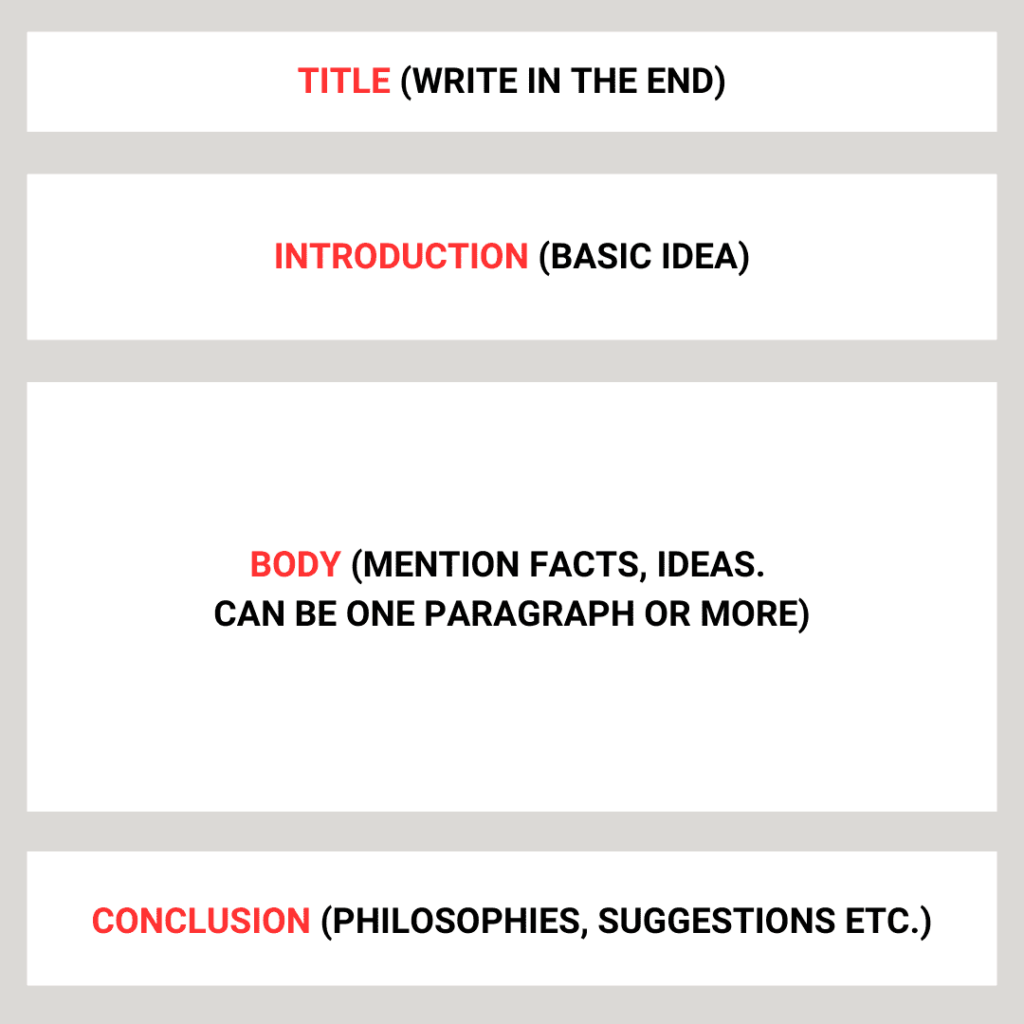This essay writing format, as the name suggests, is only for reference specifically for the students of class 9 to class 12 studying in Nagaland, Assam, West Bengal, Tripura, Manipur (NCERT) etc. However, anyone from anywhere can apply this to write essays. In exams, you need to keep the format in mind and write the essays in accordance with the topics asked.

An essay must have a minimum of three paragraphs. Imagine an essay like a sandwich. A sandwich usually has three parts: the top slice of bread, the filling inside, and the bottom slice of bread. An essay is just like that!
Title
The title comes at the top of the essay, but avoid writing it first. It is always better to write the essay first and in the end give it a title.
Introduction
This is the beginning of your essay, where you tell your reader what you’re going to talk about. This paragraph should give the reader a rough idea about the essay they are going to read. For example, if you are writing an essay on “Your Favourite Hero”, you can mention some basic facts about him/her.
Eg., Mahatma Gandhi, born Mohandas Karamchand Gandhi, was one of the most influential figures of the 20th century. His doctrine of nonviolent resistance led India to independence and inspired civil rights movements across the globe. Despite coming from a modest background, his impact on the world was profound, earning him the name “Mahatma,” meaning “Great Soul.”
Body
This is the middle part of your essay and can be one paragraph or more than one paragraph. Just like how a sandwich might have peanut butter and jelly, your essay body might have your main points or arguments. If you have more than one point to make, you put each point in a new paragraph. All facts should be included in the body.
Eg., Gandhi was born on October 2, 1869, in Porbandar, India. After studying law in England, he moved to South Africa, where he first encountered racial prejudice. This experience sparked a transformation in Gandhi, leading him to develop his philosophy of “Satyagraha,” or “Soul Force.” He believed in the power of peaceful protests and non-cooperation against injustice, a principle he would carry with him throughout his life.
Gandhi returned to India in 1915, where he became a prominent leader in the Indian National Congress. He led numerous peaceful protests and strikes against British rule, including the famous Salt March in 1930 and the Quit India Movement in 1942. These nonviolent demonstrations of civil disobedience played a pivotal role in raising international awareness of India’s struggle for independence, putting immense pressure on the British government.
And so on….
Conclusion
This is the end of your essay, where you usually don’t talk about any facts but try to make some philosophical points, morals, suggestions etc. This way, the essay gets a proper closure.
Eg., Mahatma Gandhi’s legacy is far-reaching and enduring. His commitment to nonviolence and justice, demonstrated through his leadership in India’s independence struggle, left an indelible mark on the world. His philosophy of peace continues to guide countless social and political movements, underscoring the power of nonviolent resistance in effecting change.
Sample essay
Cleanliness
Cleanliness means keeping clean. It is applied to everything in and around us. It has been said that ‘cleanliness is next to godliness’. It is a saying more precious than gold or diamond. It is our first and foremost duty to keep our body, mind, belongings and environment free from dirt and filth. If we fail, if we neglect this important thing, we have to pay very heavily for it. As such we should be zealously particular about keeping clean.
Cleanliness is essential for enjoying a good health. It is a very important factor in keeping us free from diseases. Dirt and filth are the favourite home of disease germs. If we keep our body unclean or put on dirty clothes, if we live in filthy houses and filthy environments, if we inhale impure and polluted air we are sure to fall victims to ugly diseases. We cannot escape them. On the contrary, if we keep clean in every way, diseases cannot, and will not dare to approach us. This is an established fact. Modern science has proved it beyond doubts. As this is so, it is our foremost duty to try in every possible way to keep clean.
We should therefore take daily baths and clean all dirts from our body by rubbing it with napkins and towels, while bathing. This will help us keep our pores unchecked and also help proper circulation of blood which is the essential condition of our life. We should always wash and put on clean clothes and garments. Our houses and surroundings should also be kept all clean. Else air will be polluted and we shall invite diseases by inhaling the impure air. As for food we should be very particular. We should make it our pious duty to eat only clean and fresh food because it is the food which supplies us with blood and blood makes and keeps the body going.
A healthy mind lives in a healthy body. Those who keep clean and are pure in habits, can drink deep into the cup of life. It elevates their moral and intellectual well-being and makes them experience wonderful feeling of pleasure and satisfaction in life. They become owners of spotless character by dint of their pure habits, pure minds and pure thoughts. All of us should therefore try our level best to keep clean in every way. We should teach others also to be so. If we do this we shall be able to enjoy life better and our people will go ahead in their march towards progress and prosperity.
Get notes of other classes and subjects

